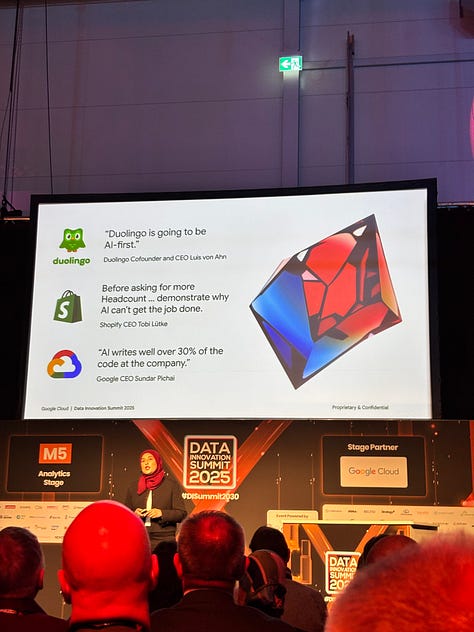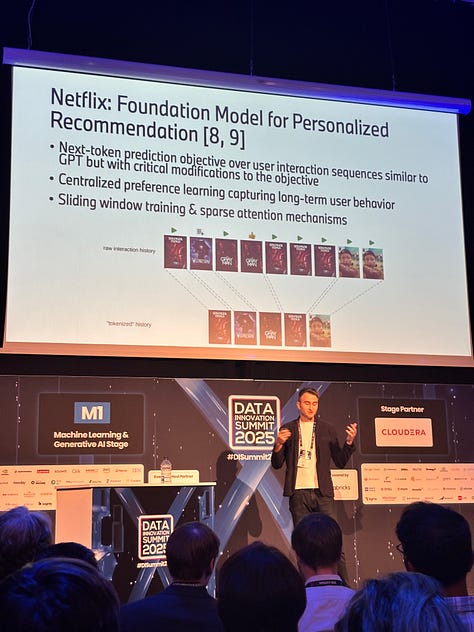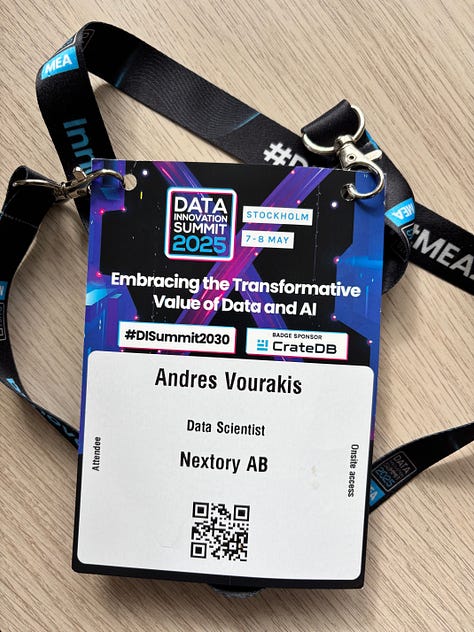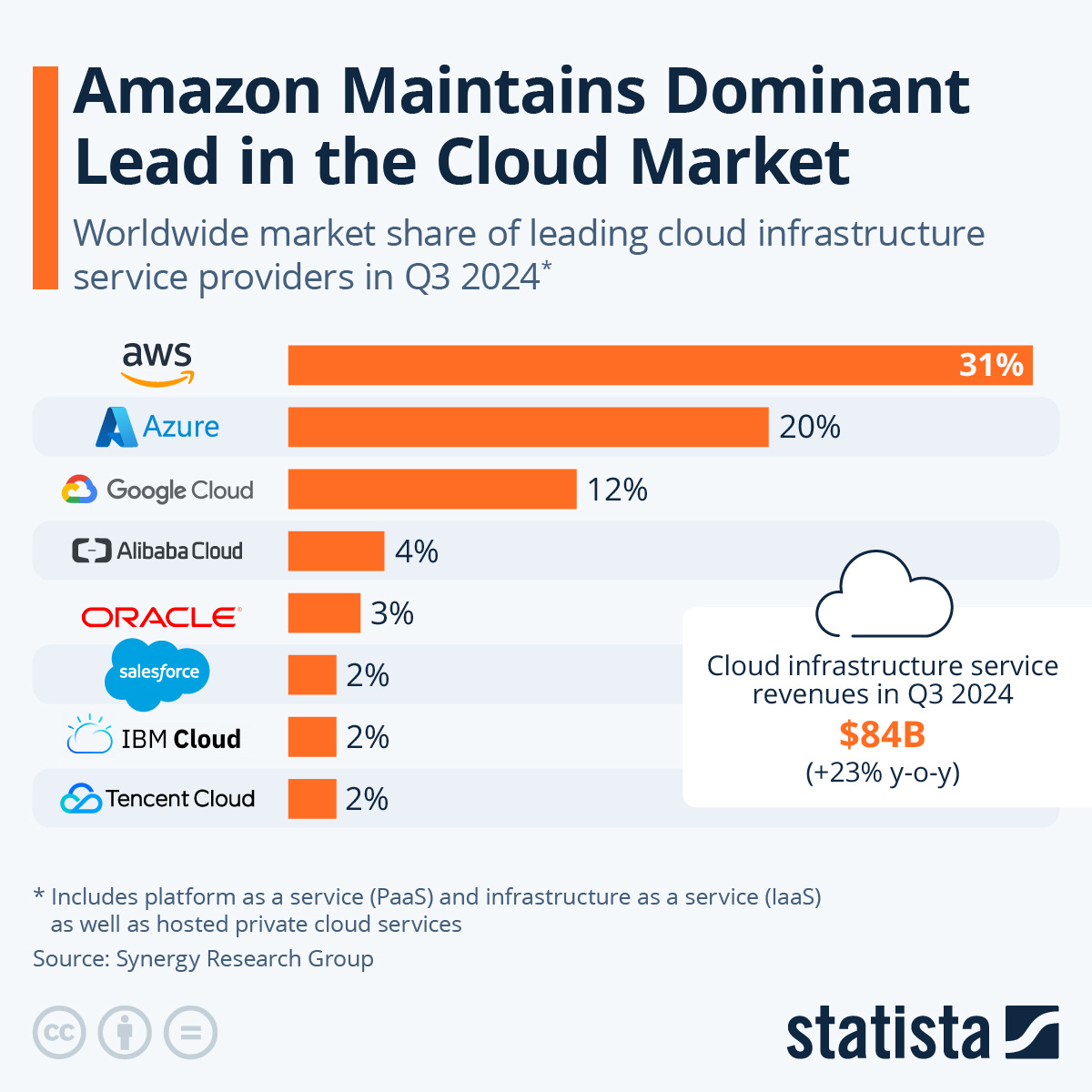How to Thrive as a Data Scientist in 2025: 3 Key Skill Shifts You Need to Make
It's not too late
We're almost halfway through the year and the list of tools data scientists now have available to improve and automate their day-to-day work keeps growing.
It’s honestly overwhelming.
Just a few days ago I was at the Data Innovation Summit 2025 in Stockholm, Sweden, networking, learning about LLMs in recommender systems (my favorite talk btw), and all the new shiny AI tools now available:



And although the new technology is promising…
Not enough people are talking about how the bar for data scientists is shifting.
Many of the skills that used to be nice-to-haves are quickly becoming the baseline, even for many entry-level roles.
So if you're preparing to enter the market in the next few months, or if you're someone who's already working as a data scientist but want to stay relevant and prepare for your next role, then I highly recommend you consider these three key skill shifts.
1. Learn to deploy
A good model in production beats a great model in a Jupyter notebook, every single time.
Companies don’t just look for great analysis, they look for impact. And impact happens when your work reaches the product or the people using it.
This is why deploying is such a in demand skill right now, but please don’t over complicate it:
Start simple, use Streamlit, Flask, or FastAPI to build lightweight apps.
Then learn how to package your work with Docker. This lets others run your app without setup headaches.
You don’t need a full deployment pipeline (although I highly recommend for more experienced Data Scientists). But you should be able to get something online, whether it’s a demo app or an API.
It shows you can ship. And that makes your work real, and therefore, more impactful.
Here is a guide to help you get started:
2. Get comfortable with Cloud
Most real-world data work happens in the cloud.
Guess what! You won’t be pulling local CSVs forever. In most roles, you’ll be working with cloud-based warehouses and automated pipelines.
That’s why knowing your way around the cloud is becoming expected, even at entry level (especially if you have aspirations of working in tech).
Just start by understanding what data scientists actually do in cloud-based environments:
They query large datasets using tools like BigQuery or Snowflake to support analysis and modeling.
They schedule lightweight data transformations in dbt or Airflow, often to clean, join, or prepare data for exploration.
They deploy models using managed services like Vertex AI or SageMaker, making them accessible to other systems or teams.
These aren't just engineering tasks. They’re part of the day-to-day work of a modern data scientist.
💡 I don't often recommend doing certifications as opposed to doing real projects, but this is one of those areas where it's really hard for you to learn it on your own. So if you have the time and can afford it, find certifications on how to work with cloud platforms like BigQuery or AWS. This is one of those things that will go a long way in your resume.
3. Integrate GenAI into your workflow
GenAI isn’t replacing data scientists (yet) it’s changing how we work.
The best data teams are already using LLMs to move faster. They’re using GenAI as a tool to unblock themselves and save time.
If you haven’t already, start experimenting with use cases like:
Prototyping code when you're stuck or exploring new approaches
Generating boilerplate functions, test cases, or docstrings
Drafting reports, summaries, or explaining your work to non-technical stakeholders
Remember, you're not competing against LLMs. You're competing against other data scientists who are using LLMs to work more efficiently.
I write more on this topic here:
A couple of great resources:
💼 Job searching? Applio helps your resume standout and land more interviews.
🤖 Struggling to keep up with AI/ML? Neural Pulse is a 5-minute, human-curated newsletter delivering the best in AI, ML, and data science.
🤝 Want to connect? Let’s connect on LinkedIn, I share lots of career bite-size advice every week.
Thank you for reading! I hope these tips help you stay relevant.
See you next week!
- Andres
Before you go, please hit the like ❤️ button at the bottom of this email to help support me. It truly makes a difference!








